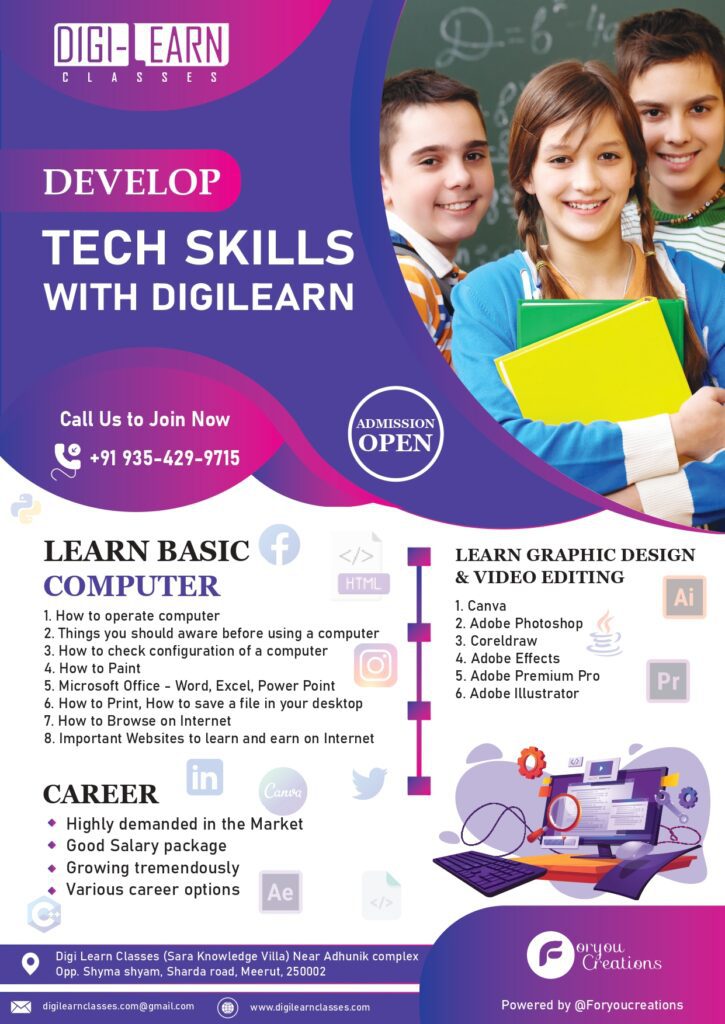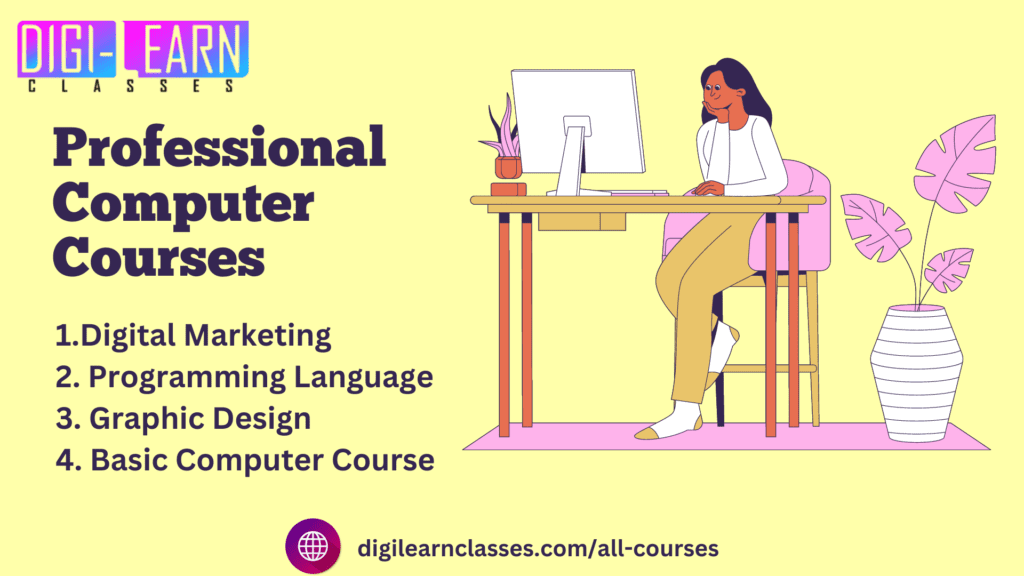
Best Professional Courses In The Market
Determining the “best” professional courses in the market depends on various factors such as individual interests, career goals, market demand, and industry trends. However, here are a few professional courses that are currently in high demand:
Digital Marketing
With the growth of online platforms, businesses require skilled professionals in digital marketing. Course in UX/UI design cover usability principles, prototyping, wireframing, and user research.
Tally Course
Tally is a popular accounting software widely used in businesses and organizations for managing financial transactions, inventory, and taxation. If you are interested in learning Tally and enhancing your accounting skills, you can consider enrolling in a Tally course. Here are some key points to know about Tally courses:
UX/UI Design
User experience (UX) and user interface (UI) design play a crucial role in product development. Courses
Basic Computer Course
A basic computer course is designed to provide fundamental knowledge and skills related to computer literacy and usage. It is suitable for individuals who have little or no prior experience with computers. Here are some key topics typically covered in a basic computer course:
Programming Languages
Programming languages are used to write instructions for computers to execute specific tasks. There are numerous programming languages available, each with its own syntax, purpose, and strengths. Here are some popular programming languages
Remember, the “best” professional course depends on your interests, aptitude, and the specific job market in your region. It’s essential to conduct thorough research, consider your career goals, and evaluate the market demand before selecting a professional course.
How To Upscale Your Career
Upscaling your career involves continuously improving your skills, knowledge, and experience to stay relevant and competitive in the job market. Here are some steps you can take to upscale your career:
Set Clear Career Goals
Define your long-term and short-term career goals. Having a clear vision will help you identify the skills and knowledge you need to acquire to progress in your desired direction.
Assess Your Current Skills and Identify Gaps
Evaluate your existing skills and knowledge. Identify the areas where you need improvement or new skills that are in demand in your industry.
Continuous Learning
Invest in lifelong learning. Enroll in courses, workshops, seminars, or online programs to acquire new skills and knowledge. Consider pursuing certifications or advanced degrees related to your field.
Stay Updated with Industry Trends
Keep yourself informed about the latest industry trends, emerging technologies, and changes in your field. Subscribe to industry publications, follow thought leaders, and join professional networking groups to stay connected and updated.
Seek Mentorship and Guidance
Connect with experienced professionals in your industry who can provide guidance and mentorship. Their insights and advice can help you navigate your career path effectively.
Networking
Build a strong professional network. Attend industry events, join professional associations, and connect with colleagues and peers. Networking can provide opportunities for career growth, collaboration, and learning from others’ experiences.
Take on Challenging Assignments
Seek out projects or assignments that challenge you and allow you to develop new skills. Be proactive in volunteering for new responsibilities that can expand your expertise and showcase your capabilities.
Develop Soft Skills
In addition to technical skills, focus on developing soft skills such as communication, leadership, teamwork, problem-solving, and adaptability. These skills are highly valued by employers and can set you apart in your career.
Embrace Professional Development Opportunities
Take advantage of professional development programs offered by your organization or industry. Attend conferences, workshops, and webinars to enhance your skills and broaden your knowledge.
Seek Feedback and Evaluate Progress
Regularly seek feedback from supervisors, colleagues, or mentors to assess your progress. Reflect on your accomplishments, areas for improvement, and adjust your career development plans accordingly. Remember, upscaling your career requires dedication, commitment, and a proactive approach to continuous learning and growth. Stay adaptable, embrace change, and seize opportunities that come your way

Popular ComputerCourses to boost your career
Learning computer courses can provide you with valuable skills and knowledge in various areas of technology. Here are some popular computer courses you can consider learning:
Programming Languages:
Python
A versatile and beginner-friendly language used in web development, data analysis, and more.
Java
Widely used for developing desktop, web, and mobile applications.
C++
Used for system software, game development, and high-performance applications.
JavaScript
Essential for web development and adding interactivity to websites.
Web Development:
HTML/CSS
Fundamental languages for creating and styling web pages.
Front-end Development
Learn frameworks like React, Angular, or Vue.js for building interactive web interfaces.
Back-end Development
Master server-side technologies like Node.js, PHP, or Ruby on Rails for creating dynamic web applications.
Mobile App Development
Android Development
Learn Java/Kotlin and Android Studio to build apps for the Android platform.
iOS Development
Use Swift and Xcode to develop applications for iPhones and iPads.
Database Management
SQL
Master the language used for managing and querying relational databases like MySQL or PostgreSQL.
Database Administration
Learn to design, optimize, and secure databases.
UI/UX Design
User Interface (UI) Design
Create visually appealing and user-friendly interfaces for websites and applications.
User Experience (UX) Design
Learn techniques for enhancing user satisfaction and usability.
These are just a few examples of computer courses you can consider learning. Assess your interests, career goals, and the industry demand to choose the courses that align with your aspirations. Online platforms like Udemy, Coursera, and edX offer a wide range of courses, including both free and paid options, to help you get started.
Best Job-Oriented Courses
There are several job-oriented courses that can enhance your skills and improve your employability. Here are some examples of job-oriented courses across different fields:
Digital Marketing
With the increasing importance of online presence, digital marketing skills are in high demand. Courses in digital marketing cover areas like search engine optimization (SEO), social media marketing, content marketing, email marketing, and digital analytics.
Web Development and Design
With the growth of the internet, web development and design skills are in demand. Courses in web development cover programming languages like HTML, CSS, JavaScript, and frameworks like React, Angular, or Node.js.
Mobile App Development
Mobile app development is a rapidly growing field. Courses in mobile app development focus on platforms like Android and iOS, teaching programming languages such as Java/Kotlin for Android and Swift for iOS.
Graphic Design
Graphic design courses teach you skills like visual communication, typography, image editing, and layout design. These skills are in demand across industries for creating marketing materials, websites, and user interfaces.
Content Writing and Copywriting
With the rise of online content, there is a growing demand for skilled content writers and copywriters. Courses in this field cover writing techniques, content strategy, SEO writing, and copywriting skills.
Finance and Accounting
Courses in finance and accounting provide a strong foundation for roles in finance, banking, and accounting sectors. Topics covered include financial analysis, financial modeling, accounting principles, and financial management.
Remember to research specific courses, institutions, and their credibility before enrolling. Consider your interests, career goals, and the current job market to choose a job-oriented course that aligns with your aspirations.

